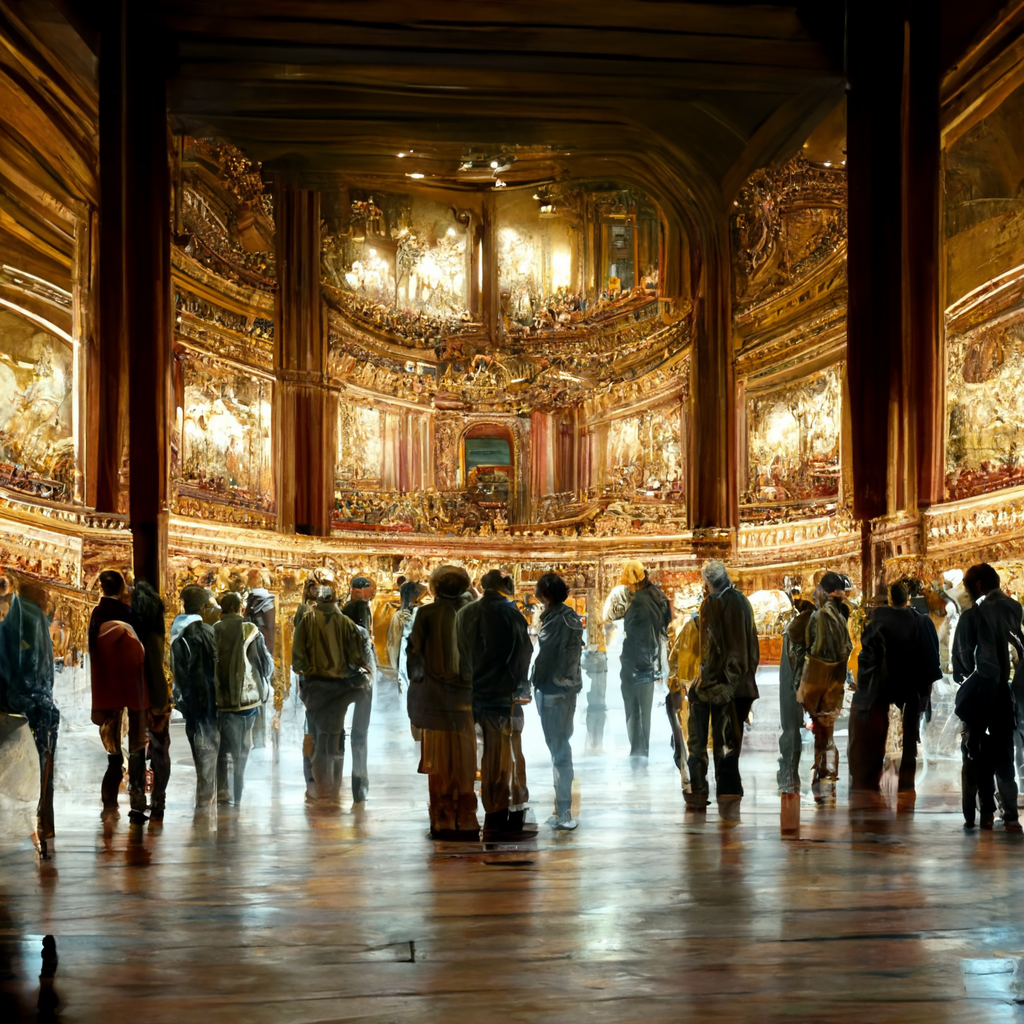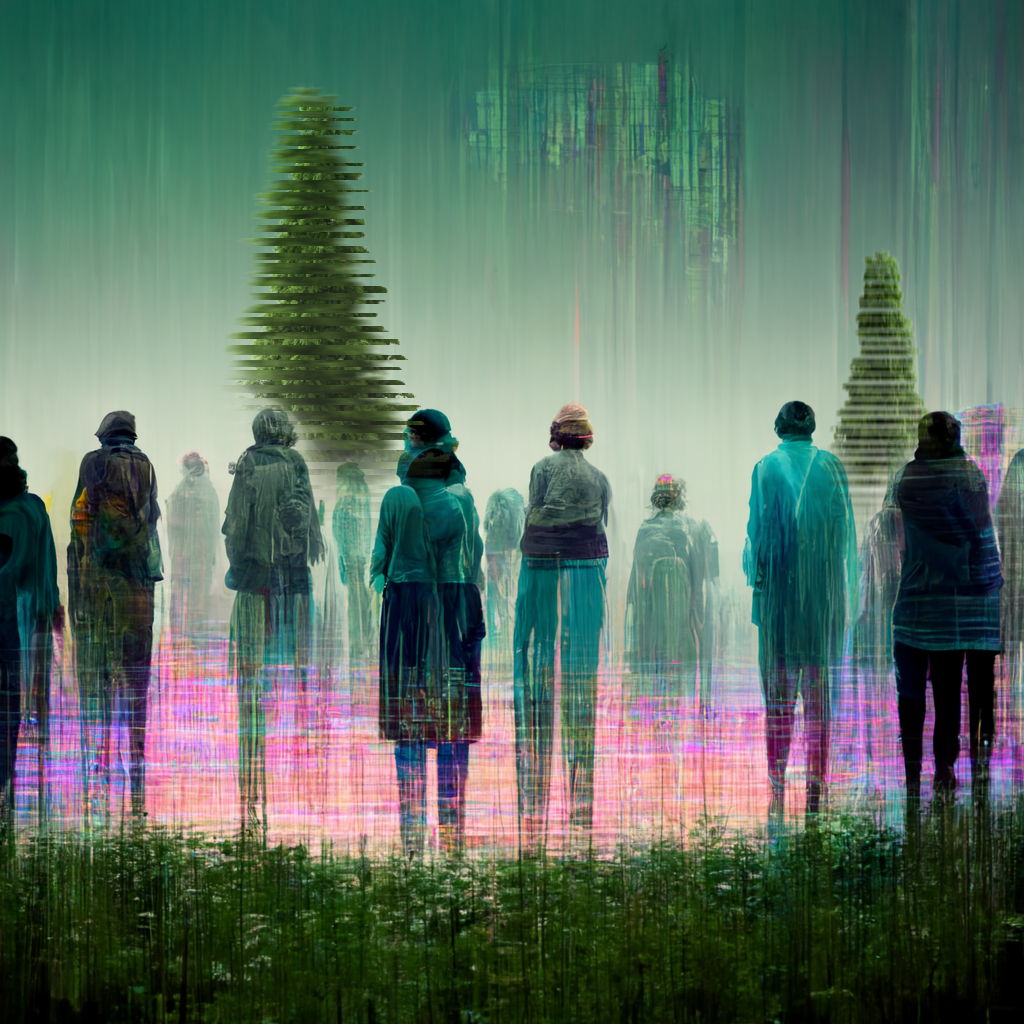What can a virtual nomadic body do?

ACT 1
The Opera’s Main Hall is crowded. Everyone is gazing at each other while the people are still arriving. The clothes and bodies are like in a showcase, competing for the looks.
EGO: “Think of “the body as the original prosthesis we all learn to manipulate, so that extending or replacing the body with other prostheses becomes a continuation of a process that began before we were born.”
EROS: Sure, that much I understand. It is only that you think of it mereley in terms of modification for the sake of modification and do not question what is beneath.
KEVIN: Interesting approach Eros, are you implying that we should discuss about the things implied beneath the transformation of one’s own body?
EGO: What’s beneath is always the same: codes for stablishing hierarchical relationships with others and the environment. The only difference is that now we have many more tools available, like this high-res skin I am wearing, which is not only valuable by how it looks on me, but also because it is a limited-edition.
EROS: “I was a young body: Black, female-identifying, femme, queer. There was no pressing pause, no reprieve; the world around me never let me forget these identifiers. Yet online I could be whatever I wanted. And so my twelve-year-old self became sixteen, became twenty, became seventy. I have aged. I died. Through this storytelling and shapeshifting, I was resurrected. I claimed my range.”
SARAH: So both statements are true somehow. The post-body is a tool for hierarchical relationships but at the same time freedom from the genetic world. Is Echo coming soon? I wonder what she would say about all of this.
EGO: Of course you can see it that way, but its still working as a tool for establishing hierarchical relations, in this case, with your IRL body and how you are perceived in a way that suits you. In my case it is more about mere banalities. I am a much more simple person.
EROS: You sure are not simple at all.
Echo enters the big room and instantly identifies the group of friends waiting for her. She is dressing with her typical outfit and her face and eyes are completely basic and sober. She looks completely generic.
EGO: How are you doing? We were just discussing about the social and psychological implications of virtual bodies. It is a shame that you missed it.
ECHO: It`s funny that you mention that. Especially in a place like this. Look over there at the guy that looks like a giant with that unrealistic ammount of muscle, or at that little girl holding a teddy bear that talks like an old-man, or even at that lady with the hi-res dress that is constantly emitting different patterns of light so bright that I think I am starting to lag.
After pointing at all of them she stays silent for a minute looking at the audience and then at her friends. They know her enough to know that she is about to start a monologue, but they allow her to do so, because she always says interesting things.

ACT 2
ECHO : “The anonymous nature of the machine and the nondifferentiated nature of its surface are proof of this. Projection enters the picture only secondarily, as does counter-investment, as the body without organs invests a counterinside or a counteroutside, in the form of a persecuting organ or some exterior agent of persecution. But in and of itself the paranoiac machine is merely an avatar of the desiring-machines: it is a result of the relationship between the desiring-machines and the body without organs, and occurs when the latter can no longer tolerate these machines.”
KEVIN: I like this idea of the body without organs and I think it has a lot to do with our current time. But I dont understand it completely. How does it relate to this idea of the emancipation of genetics?
ECHO : “It is on the body without organs, as a pivot, as a frontier between the molar and the molecular, that the paranoia-schizophrenia division is made. Are we to believe, then, that social investments are secondary projections, as if a large two-headed schizonoiac, father of the primitive horde, were at the base of the socius in general? We have seen that this is not at all the case. The socius is not a projection of the body without organs; rather, the body without organs is the limit of the socius, its tangent of deterritorialization, the ultimate residue of a deterritorialized socius.”
SARAH: And how does the body relate to its parts and to the power structures of society?
ECHO: “For one thing, Butler is not content to say that machines extend the organism, but asserts that they are really limbs and organs lying on the body without organs of a society, which men will appropriate according to their power and their wealth, and whose poverty deprives them as if they were mutilated organisms. For another, he is not content to say that organisms are machines, but asserts that they contain such an abundance of parts that they must be compared to very different parts of distinct machines, each relating to the others, engineered in combination with the others.”
EGO: Well, sure. That is what I have been saying the whole time. They are means of power that we can combine. We are in a position of privillege that we should utilize as best as we can. Transforming ourselves and stepping over in the power chain will allow us to fulfill our dreams. “Persona originally means “mask,” and it is through the mask that the individual acquires a role and a social identity. In Rome every individual was identified by a name that expressed his belonging to a gens, to a lineage; but this lineage was defined in turn by the ancestor’s mask of wax that every patrician family kept in the atrium of its home. From here, it only takes a small step to transform a persona into the “personality” that defines the place of the individual in the dramas and rituals of social life. Eventually, persona came to signify the juridical capacity and political dignity of the free man. The slave, inasmuch as he or she had neither ancestors, nor a mask, nor a name, likewise could not have a “persona,” that is, a juridical capacity (seruus non habet personam).”
EROS: But wait! That does not make sense at all. We cannot really talk of “ourselves” in an old manner anymore, because “this “absence of self-ownership” is the consent to not be a single being, an embrace of a cosmic corporeality. The digital experience is defined by a touch that breaks limits; it “is not a non-existent reality, because we live it, feel it, can be changed by it.”
After Eros said this, their hands started to look different. They all looked around and started to see that people of the Opera`s Main Hall started to transform or disintegrate, aswell as the Opera itself. Suddenly, the ceiling started to look as an open sky.

ACT 3
The characters find themselves in the middle of nature. Their bodies no longer look the same. They have completely transformed into naked beings, as Adam and Eve. The glitch has put them out of their bodies of choice.
EROS: What is happening? I don’t understand what is going on.
KEVIN: A house is a house is a house is a house…
SARAH: A body is a body is a body is a body…
EGO: It looks like a bug. Hopefully it will be over soon. Even the bots are glitching.
ECHO : This is actually quite explanatory: “when we are all stardust, we will say the media distorts the public’s perception of cosmic bodies. … I’m not opaque. I’m so relevant I’m disappearing.” The idea of glitch represents exactly what I’ve been trying to tell you. “A glitch is an error, a mistake, a failure to function. Within technoculture, a glitch is part of machinic anxiety, an indicator of something having gone wrong. This built-in technological anxiety of something gone wrong spills over naturally when we encounter glitches in AFK scenarios: a car engine calling it quits; getting stuck in an elevator; a city-wide blackout.”
EGO: Wait! Where are all my belongings? I paid a lot for the body parts I was wearing. They better not disappear once all this mess is fixed.
ECHO: “This digital diaspora therefore is an important component of glitch, as it means that bodies in this era of visual culture have no single destination but rather take on a distributed nature, fluidly occupying many beings, many places, all at once.”
EROS: I understand what you say Echo, but I’m not feeling really comfortable right now. It is so weird to be inside this naked woman body. It looks so stereotypical.
Suddenly some fragments of the Main Hall appear translucently and they can see the other people looking back at them. They hear echoes of conversational fragments referring them. They feel judged and seen.
EROS: I can see the faces of the people at the opera. It is as if they are looking down on us commenting our naked avatars. I actually feel naked in this virtual experience. it is curious that nudity is more related to the perception of others rather than to the absence of clothing.
EGO: Sure, “The desire to be recognized by others is inseparable from being human. Indeed, such recognition is so essential that, according to Hegel, everyone is ready to put his or her own life in jeopardy in order to obtain it. This is not mereley a question of satisfaction or self-love; rather, it is only through recognition by others that man can constitute himself as a person.”
ECHO: It certainly looks like that, but I don’t feel naked at all. To me this has nothing to do with nudity, which l understand as “Here one encounters only the veil itself, appearance itself, which is no longer the appearance of anything. This indelible residue of appearance where nothing appears, this clothing that no body can wear anymore -this is human nudity.” “Man was created in such a way that his body, even in the absence of clothing, was not “Naked”. The human body’s state of “Not being naked,” despite its apparent lack of clothing, is explained by the fact that supernatural grace enveloped the human person like a garment. A body without glory becomes visible: the nakedness of pure corporeality, the denudation resulting in pure functionality, a body that lacks all nobility since its ultimate dignity lay in the divine glory is now lost.”
SARAH: A house is a robot is a costume is a part is without organs is an avatar is a machine …
KEVIN: A body is a host is a home is the most truthful lie is the least one can grasp in nudity …
CURTAIN


